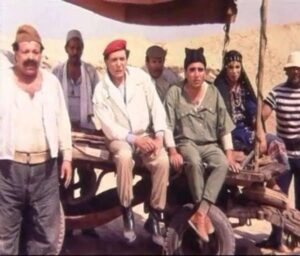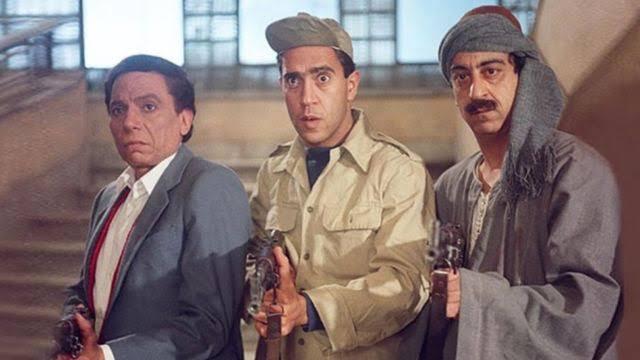If a film was a huge success for Hollywood, so the Egyptian version should be a blockbuster, albeit with a dash of the local cultural flavour. You can have a hamburger in the original, but a ta3miya sandwich (with tahina, please) is just the ticket for Cairene audiences, and still box-office receipts will hit the roof.
For example, the French movie Un Elephant Ça Trompe Enormément (1976) directed by Yves Robert was remade in 1984 as a romcom The Woman in Red directed by Gene Wilder. The film is a comedy that follows the story of a happily married husband who meets a pretty woman in red, falls for her and plans to have an affair with her. This is not to be confused with the song, Lady in Red, delivered in tremolo vocals by Chris de Hamburger in 1986.
Dah da-da-da dah da-dididah La-laaah, etc! Remember? The Magnificent Seven (1960) directed by John Sturges is the Western (in more ways than one) version of the Japanese movie Seven Samurai (or, Shichinin no Samurai 1954) directed by Akira Kurosawa about a veteran swordsman who gathers six others to protect a village from robbers. (or, in Japanese, ‘protect a virrage from robbahs’). Don’t forget the further remake with Denzil Washington and Ethan Hawke in 2016 — they sure came a long way from Training Day (2001). Now, where were we? Oh, yes. Egyptian cinema with the Egyptian version, which should be known as el-Uzamaa el-Sab3a but it is not. We are talking about Shams el-Zanati (1991) directed by Samir Seif. Set in an Egyptian oasis during World War II, the film tells the story of a tribal chief who goes to Cairo to buy weapons and he asks Shams el-Zanati (Adel Emam) to protect his oasis from Marshal Borie (Mahmoud Hemida). El-Zanati gathers six others to help him fight Borie. The atmosphere of the oasis is somehow redolent of that of the American western and desert locations, but the costumes, culture are slightly different, as you might expect. Even so, The Magnificant Seven is an international classic, whereas Shams el-Zanati is a commercial movie with the drama, action and comedy and local superstar Adel Emam, so it is more appealing to Egyptian and Arab audiences.

Adel Emam was keen to add to his credits films that put bums on seats and eyes on the screen. One of Emam’s famous political movies is El-Erhab Wel-Kabab (Terrorism and Kebab, 1992) directed by Sherif Arafa and screenplay by Wahed Hamed. The film is about Ahmed Fateh el-Bab (Adel Emam) who wants to complete paperwork to transfer his children from one school to another, but he cannot, because he is given the run-around by government bureaucracy — reminiscent of Meshwar Katkout (1985) with Hassan Abdeen. As events develop, he brings a weapon and is accused of taking hostages and each one has his own story. This should remind you of Al Pacino in Dog Day Afternoon (1975) directed by Sidney Lumet, but instead of robbing a bank to pay for his girlfriend’s operation, the Egyptian version looks at the life of an ordinary person that takes an unexpected turn.
Another movie starring Abdel Emam is loosely based on another Pacino piece. Movie: Amir El-Zalam (Prince of Darkness, 2002) directed by Ramy Emam, about Saeed el-Masry (Adel Emam) who was a pilot who lost his eyesight in the October War, but he was determined to live life to the full and never gave in to his disability. Have you guessed which Pacino film? Scent of a Woman (1992), directed by Martin Brest, which is based on the Italian original Profumo di donna (1974), a Commedia all’italiana film directed by Dino Risi, which is, in turn, based on Il buio e il miele (Darkness and Honey) a story by Giovanni Arpino. In the American, Mr Pacino drives a Ferrari blindly, while in the Egyptian film, Mr Emam pilots an aircraft.
The Egyptian version is primarily for laughs, but Mr P. won an Oscar for an insightful (sorry!) portrayal of a character that comes to the rescue of a wronged student.
So, local remakes are usually a good idea. Stories about local remakes will make wonderful documentaries that might inspire viewers to see the original films or drive around Tahrir Square blindfolded.






Discussion about this post